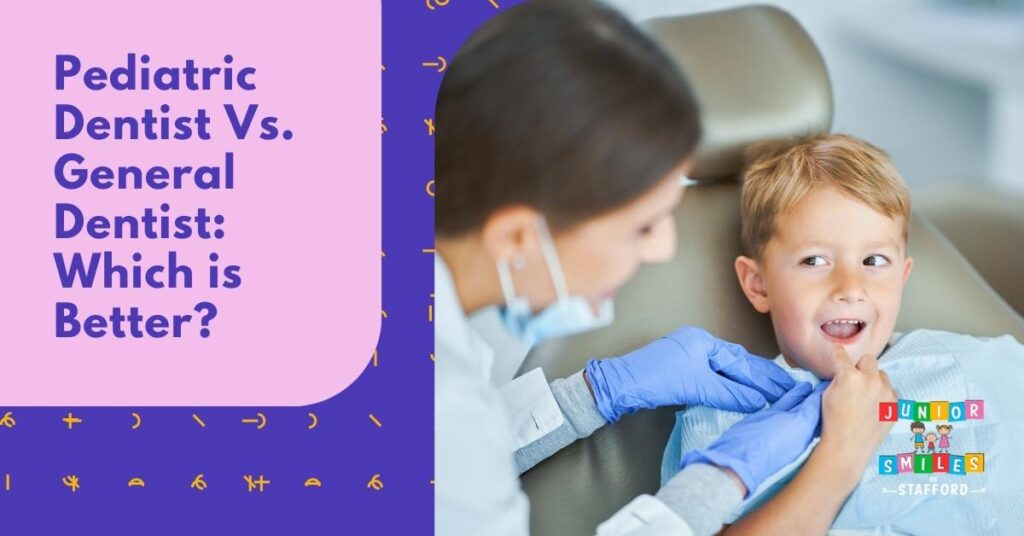Pediatric Dentist vs. General Dentist: Which is Better?

Everyone gets confused between a pediatric dentist and a general dentist, which is understandable because both are dentists and have gone through dental school. However, there’s still a difference between pediatric dentistry and general dentistry, and deciding where you should take your child is hard.
The key difference between a pediatric dentist and a general dentist is that the former focuses solely on dental care for children while the latter does not. When it comes to treating children, pediatric dentists have additional training and knowledge that other dental professionals may not have.
It is important to have an informed decision about who is going to take care of your child’s dental health. Read this blog to know more!
Pediatric Dentist Vs. General Dentist: Which is Better?
Everyone gets confused between a pediatric dentist and a general dentist, which is understandable because both are dentists and have gone through dental school. However, there’s still a difference between pediatric dentistry and general dentistry, and deciding where you should take your child is hard.
The key difference between a pediatric dentist and a general dentist is that the former focuses solely on dental care for children while the latter does not. When it comes to treating children, pediatric dentists have additional training and knowledge that other dental professionals may not have. They are experts in managing child behavior, understanding child psychology, and promoting healthy child development.
It is important to make an informed decision about who is going to take care of your child’s dental health, especially when dealing with baby teeth, permanent teeth, and adult teeth. Read this blog to know more!
General Dentists vs. Pediatric Dentists: The Differences
Despite the fact that both general dentists and pediatric dentists are capable of providing dental care for children, the training requirements for each are different. Doctor of Dental Surgery (DDS) or Doctor of Dental Medicine (DMD) degrees are required for all dentists, pediatric and general, following their undergraduate training. After obtaining a DDS or DMD, it’s what individuals do next that makes all the difference.
Pediatric Dentists
Doctors who specialize in pediatric dentistry must complete additional training in the form of a two-year residency to receive their board certification. This program teaches pediatric dentists how to work with children, understand their needs, make them feel at ease, and identify and solve unique dental issues that children face; thus, they are trained to understand child behavior. They provide care to children with special needs, as well as newborns, children, and teenagers, all while promoting healthy teeth.
Specialized training is required for dentistry for children, focusing on children’s oral and dental health as well as their physical development and any special requirements they may have. Tooth decay and tooth placement, crowding, crooked teeth, and missing teeth are all common problems they deal with. Pediatric dentists can prevent and treat tooth decay before it affects permanent teeth because youngsters are more susceptible to this form of tooth decay. They are also skilled in handling natal teeth, tooth loss, shark teeth, supernumerary tooth, and issues related to tooth placement. Some of the most common methods they use include:
- Fluoride treatments
- Sealants
- Interpreting X-rays
- Filling cavities
- Fixing broken teeth
- Managing spacing issues
- Encouraging and helping break bad dental habits
- Cleanings
- Pediatric sedation for anxious children
General Dentists
Dental care for patients of all ages is sometimes referred to as “family dentists” when provided by general practitioners. However, the qualifications of general dentists must be taken into consideration. General dentists have DMD or DDS degrees, indicating they have completed four years of undergraduate education and four years of dental school, which includes classroom and clinical training. Most general dentists are ABGD-certified.
Dentists who specialize in general dentistry can diagnose, prevent, and treat a wide range of dental issues, including those related to the overall health of the patient. They may offer cosmetic dentistry services and are capable of handling decay in children. Even though they haven’t received further education training to become pediatric dentists, they can still treat children. Treatments that they frequently use include:
- Gum disease care
- Veneers
- Crowns and bridges
- Cleanings
- Dental implants
- Preventing diseases
- Interpreting X-rays
- Sealants
- Root canals
- Preventative education
General Dentists vs. Pediatric Dentists: Dental Tools and Office Environment
Pediatric Dentists
A pediatric dental office must have an ambiance that is welcoming and warm. Their office must give off a compassionate experience for the child, reducing any child dread. An office that helps kids feel more at ease by creating a welcoming, entertaining, and playful environment. Distractions like video games, television, and books are sometimes offered to divert kids’ thoughts off of potentially worrisome feelings. Moreover, they need kid-friendly tools that are small enough to fit in little mouths and get around baby teeth and primary teeth.
General Dentists
Due to the fact that the majority of their patients are over the age of 18, they may not have the most kid-friendly setting. Also, treatment may be more difficult and uncomfortable for the kid if the dental office isn’t equipped with pediatric dental instruments.
Which Should You Choose?
For each family, the choice of a dentist is based on their own needs and preferences. There is no one-size-fits-all answer when it comes to your family’s dental and overall health. However, there is a lot that a pediatric dentist can do for children. The health of your children’s baby teeth can have a huge impact on their future if they are diagnosed and treated by an expert. If you use a pediatric dentist, your child’s dental care will be in good hands.
Choose Junior Smiles of Stafford For Your Child’s Dental Needs
Understanding the differences between pediatric dentists and general dentists is crucial for making an informed decision about your child’s dental care. Pediatric dentists specialize in treating children, using kid-friendly tools and creating a welcoming environment that eases dental anxiety. General dentists, while skilled in treating patients of all ages, may not have the specialized training or child-centric office setting.
When considering dental care for your child, remember that the health of their baby teeth sets the foundation for their future oral health. Choosing a pediatric dentist ensures that your child’s dental needs are met with expertise and understanding. If you’re looking for a caring and professional pediatric dentist, consider reaching out to Junior Smiles of Stafford. Our team is dedicated to providing excellent dental care in a child-friendly environment, ensuring that your child’s dental visits are joyful and stress-free.
To learn more about our services and how we can help keep your child’s smile healthy and bright, contact us today! Remember, the right dental care can make a world of difference in your child’s overall health and wellbeing. Call us now to schedule an appointment and experience the difference a pediatric dentist can make!

